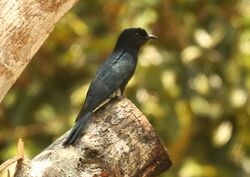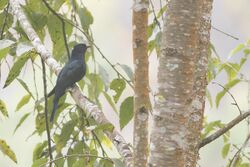Biology:Square-tailed drongo-cuckoo
| Square-tailed drongo-cuckoo | |
|---|---|

| |
| Khao Yai National Park - Thailand | |
| Scientific classification | |
| Domain: | Eukaryota |
| Kingdom: | Animalia |
| Phylum: | Chordata |
| Class: | Aves |
| Order: | Cuculiformes |
| Family: | Cuculidae |
| Genus: | Surniculus |
| Species: | S. lugubris
|
| Binomial name | |
| Surniculus lugubris (Horsfield, 1821)
| |
The square-tailed drongo-cuckoo (Surniculus lugubris) is a species of cuckoo that resembles a black drongo. In the past the species S. lugubris included the subspecies dicruroides which is now treated as a separate species the fork-tailed drongo-cuckoo. The species in its restricted sense is found along the Himalayas extending east into Southeast Asia. The calls are series of piercing sharp whistles rising in pitch but shrill and choppily delivered.[2]

Description
It can be easily distinguished by its downcurved beak and the white barred vent and outer undertail, and the tail only notched with slightly flared tips. In flight a white wing-stripe is visible from below. It is a brood parasite on small babblers. It is not known how or whether the drongo-like appearance benefits this species but it is suspected that it aids in brood-parasitism just as hawk-cuckoos appear like hawks.[3]
The square-tailed drongo-cuckoo was formerly considered conspecific with the fork-tailed drongo-cuckoo (together known as the Asian drongo-cuckoo), but vocal and morphological differences suggested that the species should be split.[2][4] That treatment is followed here.
References
- ↑ BirdLife International (2016). "Surniculus lugubris". IUCN Red List of Threatened Species 2016: e.T22728167A94972858. doi:10.2305/IUCN.UK.2016-3.RLTS.T22728167A94972858.en. https://www.iucnredlist.org/species/22728167/94972858. Retrieved 11 November 2021.
- ↑ 2.0 2.1 Rasmussen, P. C. & Anderton, J. C. 2005 Birds of South Asia. The Ripley Guide. Smithsonian and Lynx Edicions
- ↑ Davies NB & Welbergen JA (2008). "Cuckoo-hawk mimicry? An experimental test" (PDF). Proc. Biol. Sci. 275 (1644): 1817–1822. doi:10.1098/rspb.2008.0331. PMID 18467298. PMC 2587796. http://www.zoo.cam.ac.uk/zoostaff/bbe/Welbergen/Papers/Davies%20%26%20Welbergen%202008.pdf.
- ↑ Fu-Min, Lei & Robert B. Payne (2002) Territorial songs of the drongo cuckoo complex (Surniculus lugubris & S. velutinus). The Raffles Bulletin of Zoology 50(1):205-213 PDF
Wikidata ☰ Q1268852 entry
 |


